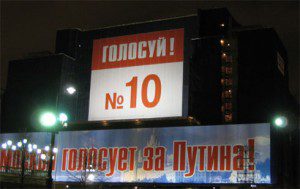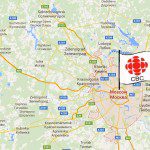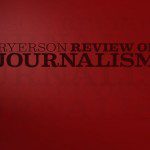Letter From Russia
Fluff abounds in a country where the politics is anything but straightforward and journalism is still a dangerous profession

An election sign near the Red Square in Moscow. Translated it means, “Vote! Moscow votes for Putin”
(Photo by: Alina Seagal)
Outside my Soviet-style apartment a rhythmic ghraavk-ghrrraaavk-ghravvvk fills the air: someone is shoveling snow. Inside, some Russian anchor, whose name I’ll never remember, fills a small television screen to announce the results of yesterday’s parliamentary election. President Vladimir Putin’s United Russia party won, but the correspondent briefly alludes to complaints about violations at the polling stations and immediately dives into the next subject. “Hello-oo?” I yell at the screen. “What kind of violations?” I react that way a lot while trying to get news from local reporters.
Western observers often criticize Putin, the former KGB agent who has been president since 2000, for strict controling the media. But journalism in Russia remains political, even if it’s the one subject reporters wish to avoid. Let’s call it the politics of silence and avoidance. Fluff — such as a lengthy piece about European pilots preparing for an air show — fills reports here. Just a few weeks ago, the local media became obsessed with a single question: when will it get warmer in Russia? Russian journalist Igor Malakhov complains, “Most of the media in Russia cannot serve as a source of balanced and well-informed coverage as it is often used by politicians and in commercial interests for manipulating public opinion.”
Putin receives plenty of one-sided coverage. His pale blue eyes, projecting hawk-like concentration, often stare from television screens in Russia. But with an omission here, a one-sided presentation there, gaping holes still corrode political reports. Though no one wanted to admit this on the record, state-owned national channels have lists of people they aren’t to cover and opponents of the United Russia party received limited exposure during the parliamentary election campaign.
Censorship has been around since the czars governed this land. Some literary critics argue that Russian novelists carried out political journalism instead and this gave rise to literary journals. The battered and thick light-blue spines of old issues of Novii Mir (New World) still appear on some Russian bookshelves. But demand for these publications died down after Perestroika. Though never completely free, reporting seemed simpler for a while.
Russia is now a pathetic 144th place on Reporters Without Borders’s World Wide Press Freedom Index, and only 25 countries were worse (Canada was 18th). The Press Ministry shut down TVS, the last privately-owned national network, in 2003, blaming financial and management problems. And three reporters were murdered in 2006 alone. So serious investigative journalism remains dangerous and almost unpublishable. “Journalists perform a very different social function in Russia,” explains local reporter Nadia Popova. In a way, correspondents exist here to entertain the masses.
After Leonid Parfyonov, a trusted Russian broadcaster who was critical of the administration and hosted wildly popular historical documentaries, interviewed the widow of murdered Chechen rebel leader Zelimkhan Yanderbiyev, he lost his job. The Kremlin disapproves of journalists communicating with Chechen terrorists, especially when they’re talking about a murder Russian intelligence officers were involved in. Parfyonov rarely appears on local television these days.
Fluff is safer. A few days before the parliamentary elections, I saw no stories about arrested opposition leaders. Instead, a local newscast featured a lengthy piece on the caviar industry. Spiced up with clichés — valued highly in the Russian school of writing — such reports often feature entertaining, though politically neutral, information.
The local political elite remains unaccustomed to persistent questioning from journalists, says Popova. Accountability to the media remains half-theoretical. With an overwhelming conviction among the locals that most reporters are easily bribed, those meant to be watchdogs shrink to the size of Chihuahuas. Even the coverage of this month’s Georgian presidential elections demonstrates that the Russian media remains muzzled, says Malakhov. Most foreign media wrote that Western and European observers deemed the election of a pro-western president broadly fair. Most Russian media promoted the opposition’s theory of extreme falsification of the results.
Russia Today’s (RT) website claims it is “the first 24/7 English-language news channel to present the Russian point of view on events happening in Russia and around the globe.” Many consider the state-funded station with its British-sounding hosts too biased, even in Russian standards. When the city of Sochi won the 2014 Olympic Games, for example, RT pushed the story ahead of other headlines for weeks. The emphasis is on selling, rather than reporting.
Amid the weather and caviar stories, however, journalists still try to talk politics and publications still conduct investigative work. RT let independent Canadian journalist Fred Weir openly comment on the parliamentary election in a live broadcast. Popova tells me that a correspondent from a Russian news website www.gazeta.ru posed as a teacher to discover that educators were informed they must vote together on the day of the elections. And Novaya Gazeta, a newspaper known for its investigative journalism, published some of Anna Politkovskaya’s internationally acclaimed reports on the Chechen conflict, before she was murdered over a year ago.
But, for now, weak media laws offer little protection. Natalia Morar, a Moldovan-born journalist working for a Moscow-based New Times magazine, was banished from Russia last month because, she believes, she wrote an article examining the state’s funding of the parliamentary elections.
Those who report for the foreign media — as Popova and Malakhov do — are safer, but many journalists simply learn to work around their leashes and the Russian people learn to read between the lines.
by Alina Seagal
Alina Segal was the Online Editor for the Summer 2008 issue of the Ryerson Review of Journalism.









































